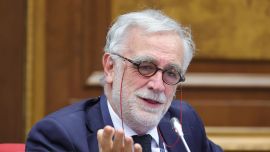President Alberto Fernández told the United Nations General Assembly on Tuesday that “humanity is at risk” from injustice, hate speech and political violence as he addressed the attempted assassination of Vice-President Cristina Fernández de Kirchner for the first time on the global stage.
The Peronist leader also called for an end to hostilities in Ukraine and the "recovering of the rule of peace" in the world at large, as he criticised the February 24 "military advance of the Russian Federation on the territory" of its neighbouring country.
Fernández’s speech began by addressing the failed shooting attempt on Fernández de Kirchner's life on September 1 in Recoleta, Buenos Aires.
The assailant, 35-year-old Fernando Andrés Sabag Montiel, approached the vice-president from a crowd of her supporters, pointed a gun at her head, pulled the trigger twice, but the gun failed to fire.
Four people have so far been arrested for the attack on the vice-president, which investigators believe was planned in advance.
Referring to the attack, Fernández told world leaders in his speech that “many times in history, assassinations have been the prologue to great tragedies.”
“Based on rejection or hatred towards the victims, those who perpetrated such actions broke public peace and opened the doors to enormous social disputes," he added.
Warning that “extremist and violent speech” could put the rule of law at risk, the Frente de Todos leader denounced "those with specific interests who seek to weaken and erode democracies and promote extreme polarisation."
Yet Argentina’s head of state said that he is confident the country would be able to maintain its democratic consensus and reject political violence, citing the lessons learnt following the fall of the 1976-1983 military dictatorship.
Fernández thanked the global community for the solidarity Argentina had received in the wake of the failed attack, which he admitted had shocked the nation.
"In Argentina, the attempt to assassinate the vice-president not only affected public tranquillity. It also sought to disrupt a virtuous collective construction that next year will celebrate four decades of life. In 1983, we recovered democracy and began a long historical cycle in which different political forces alternated in government," the head of state continued.
"The Argentines built an agreement of 'Nunca más' [“Never again”] to state terrorism and political violence. I am sure that they [the attackers] will not succeed in changing the broad consensus of Argentine society.”
Lashing out at “fascist violence that disguises itself as republicanism,” Fernández called for a “strong global rejection of those who promote division in our communities.”
‘Injustices and inequalities’
In what was his first in-person appearance before a UN General Assembly, Fernández also reiterated Argentina’s sovereign claim over the disputed Malvinas (Falkland) Islands, calling on Britain to return to the negotiating table.
He also called for Iran to show cooperate in investigations seeking to clarify and identify the perpetrators of the 1992 Israeli Embassy and 1994 AMIA Jewish community centre bombings in Buenos Aires, demanding that those responsible be "identified, tried and eventually sentenced" for their crimes.
Fernández also referred to the issue of food security, a subject that he had held meetings about on Tuesday on the sidelines of the General Assembly. Argentina is one of the world’s leading producers of cereals and beef and the Peronist leader vowed to assist those in need.
"We must ensure food security for all the inhabitants of the planet, we cannot go through these times with famine. Argentina will play its role as a reliable supplier of healthy food and also of food production technology," he said.
Though he did not name the United States government directly, Argentina’s leader also alluded to Washington and its ongoing sanctions on Cuba and Venezuela, calling for their removal.
"I want to draw attention to the use of unilateral coercive measures. Argentina joins Cuba and Venezuela in calling for the lifting of the blockades that those nations suffer," he said.
“We live in a world where injustices and inequalities are increasing. At the same time, the risks to democracies are growing, peace is breaking down and uncertainty is growing, and we have an ethical duty that cannot be postponed," said the head of state.
"There is still time to stop many of the threats facing humanity. The injustices we see will only worsen if extreme positions take hold, if wars are sustained over time, deepening hunger and if persistent inflation corrodes the incomes of the weakest,” Fernández continued.
“We must work together in solidarity," said the president. “With humility, Argentina extends an appeal to all the countries of the world to build a new global paradigm that ensures prosperity with social justice.”
– TIMES/NA/AFP
























Comments